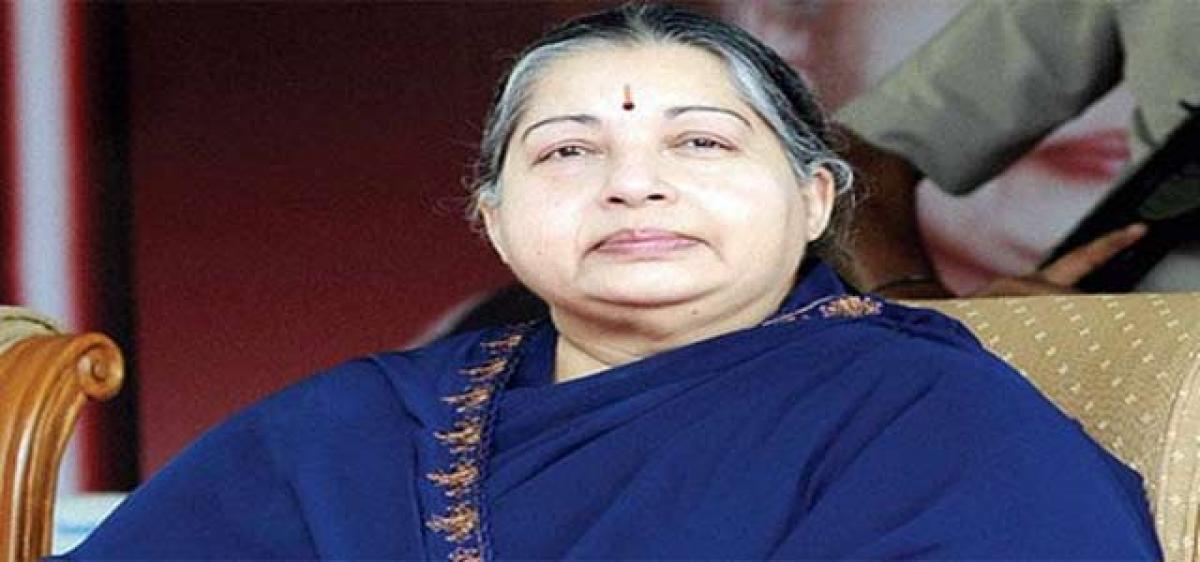An epic tale ends; the script begins

In the saga of Tamil Nadu politics, an epic has just come to an end. Myth, legend, folk tale and history all got incorporated beautifully to narrate the tale of a warrior called Selvi Jayalalithaa.
In the saga of Tamil Nadu politics, an epic has just come to an end. Myth, legend, folk tale and history all got incorporated beautifully to narrate the tale of a warrior called Selvi Jayalalithaa.
This particular epic was of national significance in the sense that it embodied the history and aspirations of a nation in its own way.
Whenever a king or an emperor, particularly a powerful one, seeks his heavenly abode, there is a pall of gloom all over.
As the mist of the angst slowly lifts itself to provide for the life around to get noticed in the absence of the patriarch (in this case, perhaps, a matriarch), questions regarding life ahead descend in a heap.
A palace always remains quiet because, quiet are its ways. Those seemingly going around doing their chores with precision in their majesty's service may look dutiful and loyal to the general eyes.
A more prying one picks up the long shadows to assimilate and understand the goings-on assiduously. Because such eyes do not get carried away by the loyalty on display and they do seek to fathom the narrative doing the rounds in the corridor. The adage "the king is dead, long live the king" lives on forever, as the kingdom has to go on.
Tamil Nadu needs to go on. So who is going to be the king? Or who is going to be the king maker? Are we going to see a smooth transition of power and if so, into whose hands?
Who is going to be the loyal servant of Amma who is destined to take over the fiefdom? Will the people accept the successor if it is a political manoeuvre alone without popular vote?
The task ahead for whoever wishes to engineer the scheme is to create a convincing God, if not as convincing as Amma herself. That is the least solvable problem.
Unlike elsewhere, Tamil Nadu accepts the first cause uncaused, omniscient and omnipotent and looks forward to seeing one at the helm.
If Sasikala, currently in-charge of the Poes Garden, seeks to occupy the slot then she needs to have it all as Amma did, in apparatus: invocation, digression, similes, legend, history, folklore, magic, the supernatural and eloquence, perilous journeys and scenes in the underworld and battles. The range is colossal, the sweep majestic.
Here is where questions arise. Sasikala survived some dark nights to be seen back in the Poes Garden. Her family was not as welcome as much her inside the palace.
Several of the qualifications mentioned above are yet to be revealed. Her battle all these years was confined to regaining the confidence of Amma.
Of course, the master stroke came when she, surrounded by her full family retinue, stood guard over a tri-colour draped Amma.
The manner in which the script was played till the fateful announcement around midnight, had all the elements of intrigue to it. In a world of regional parties obedience is all pervasive. The hierarchical arrangement is not a happenstance.
The world view of such parties and those ruling the same is that all creation is arranged in various hierarchies.
The proper way for the world, according to them, is for inferiors to obey superiors, because, superiors are, well, superior.
A king is a king not because he is the chosen one but because he is superior to his subjects. It is, therefore, not just proper to obey the king; it is also morally required.
Conversely, if the king proves to be unfit or not superior to his subjects, any revolution could also be justified. King or queen, call the rulers what you like, the rule remains unchanged. As I said earlier, more so in Tamil Nadu.
So, what was Amma's wish? No one ever knows. In Milton's Paradise Lost, God places one prohibition on Adam and Eve – not to eat from the Tree of Knowledge.
The prohibition is not so much a matter of the fruit of the tree as it is obeying God's ordinance. The proper running of the universe requires the obedience of inferiors to their superiors.
By not obeying God's rule, Adam and Eve bring calamity into their lives and the lives of all mankind. Critics have expounded the same brilliantly.
The significance of obedience to superiors is not just a matter of Adam and Eve and the Tree of Knowledge; it is a major subject throughout the poem.
Satan's rebellion because of jealousy is the first great act of disobedience and commences all that happens in the epic.
When Abdiel stands up to Satan in Book V, Abdiel says that God created the angels "in their bright degrees" and adds "His laws our laws."
Abdiel's point is that Satan's rebellion because of the Son is wrong because Satan is disobeying a decree of his obvious superior. Satan has no answer to this point except sophistic rigmarole.
Further instances of the crucial importance of both hierarchy and obedience occur in both large and small matters.
The deference with which Adam greets Raphael shows the human accepting his position in regard to the angel.
The image is one of the proper manners between inferior and superior. Eve's normal attitude toward Adam reflects the same relationship.
The crucial moment in the poem results from disobedience and a breakdown of hierarchy. Eve argues with Adam about whether they should work together or apart, and Adam gives in to her.
The problem here lies with both humans. Eve should not argue with her superior, Adam, but likewise, Adam, should not yield his authority to his inferior, Eve.
When Eve eats the fruit, one of her first thoughts is that the fruit "may render me more equal" to which she quickly adds, "for inferior who is free?” Her reasoning, from Milton's point of view, is incorrect.
Freedom comes precisely from recognising one's place in the grand scheme and obeying the dictates of that position.
By disobeying God, Eve has gained neither equality nor freedom; she has instead lost Paradise and brought sin and death into the world.
Likewise, when Adam also eats the fruit, he disobeys God. Further, he disobeys by knowingly putting Eve ahead of God. Disobedience and disruption of the correct order result in sin and death.
Finally, in the last two books of the epic, Milton shows example after example of people who ignore the responsibilities they have and try to either raise themselves above God or disobey God's commands. The result is always the same — destruction.
Milton's theme in Paradise Lost, however, does not end with the idea of disobedience. Milton says that he will also "assert Eternal Providence."
If Man had never disobeyed God, death would never have entered the world and Man would have become a kind of lesser angel.
Because Adam and Eve gave in to temptation and disobeyed God, they provided the opportunity for God to show love, mercy, and grace so that ultimately the fall produces a greater good than would have happened otherwise.
This is the argument about the fall called felix culpa or "happy fault." Where is the God operating from in matters – Tamil Nadu? There is one now in case of Amma's land and in her absence.
Let us not forget it. He gives all players a free will and also waits for the Satan's intervention. Human beings could always fault.
For the God who monitored Amma's health all through, it is an easy job monitoring her loyalists. The Palace shall have its intrigues, but God shall supervise them!









